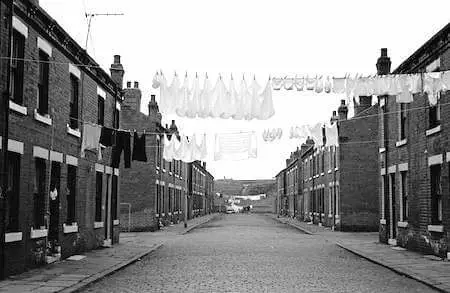The proverbial saying ‘Don’t wash your dirty linen in public’ advises us to avoid making personal matters, which those involved may consider private or embarassing, public.
In the USA, the ‘air your dirty washing in public’ variant is often used.
The proverbial saying ‘Don’t wash your dirty linen in public’ advises us to avoid making personal matters, which those involved may consider private or embarassing, public.
In the USA, the ‘air your dirty washing in public’ variant is often used.
This proverb makes a figurative reference to the washing and drying of clothes. In the past and many people didn’t have the space or facilities to dry washing privately. This picture shows clothes being hung to dry across a street in Leeds, Yorkshire in the 1960s and this is still a common sight today. Keeping one’s dirty linen (especially underwear) away from prying eyes was the preserve of the more affluent and genteel sections of society.
The original form of this phrase would have been more often heard in Lyon than Leeds though, as the proverb was first popular in France and later migrated to English-speaking countries.
The phrase is often creditted to Napolean Bonaparte. Various sources say that Napoleon used it on his return from Elba in 1815:
Il faut laver son linge sale en famille
[One should wash one’s dirty linen at home]
There’s no documentary evidence to prove that Napolean was an early user of this expression but there’s no especial reason to doubt it.
Although Napolean’s usage gave the proverb some cachet in France it wasn’t the first time it had been used. There are English versions of the phrase which predate 1815. The first one that I know of is from the American writer Thomas Green Fessenden, who published in both England and the USA. His book Pills, Poetical, Political, and Philosophical, was published in 1809 and includes:
The man has always had a great itch for scribbling, and has mostly been so fortunate as to procure somebody who pitied his ignorance, to ‘wash his dirty linen’.
That citation appears to assume that the reader would have been familiar with the phrase, although earlier examples of it in print haven’t yet surfaced.
Back to France and another early use of the phrase, this time from Honore De Balzac in the novel Eugenie Grandet, 1833:
Il faut laver son linge sale en famille, disait Napoleon.
[You have to wash your dirty laundry as a family, as Napoleon said]
So, whether or not Napolean used the phrase in 1815, Balzac believed it in 1833.
By 1867, which is the date that many sources cite as the origin of the expression, it was well established both in France and England. It appears in Anthony Trollope’s novel The Last Chronicle of Barset, 1867:
There is nothing, I think, so bad as washing one’s dirty linen in public.
By the emnd of the century the proverb was well enough known for Oscar Wilde to make an irionic joke out of it. In The Importance of Being Earnest, 1895. He has his character Algernon Moncrieff say:
The amount of women in London who flirt with their own husbands is perfectly scandalous. It looks so bad. It is simply washing one’s clean linen in public.

A B C D E F G H I J K L M N O P Q R S T UV W XYZ
American Animals Australian Bible Body Colour Conflict Death Devil Dogs Emotions Euphemism Family Fashion Food French Horses ‘Jack’ Luck Money Military Music Names Nature Nautical Numbers Politics Religion Shakespeare Stupidity Entertainment Weather Women Work
Have you spotted something that needs updated on this page? We review all feedback we receive to ensure that we provide the most accurate and up to date information on phrases.